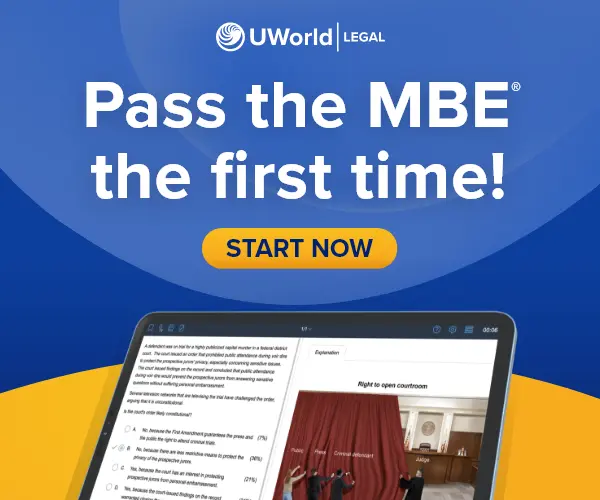Let’s face it: The English language can drive anyone bonkers. Words that are spelled differently and mean completely different things … but are pronounced the same way (e.g., way and weigh, cereal and serial, bear and bare)? Check. Words that completely change meaning when you switch or add a single letter (e.g., proscribe and prescribe, wave and waive, ingenious and ingenuous)? Check. It’s enough to make a person change languages.
Do we have an overarching, catchall rule to help you with this? Sadly, there isn’t one. But we can give you the next best thing! With apologies to David Letterman’s Top 10 Lists, here are UWorld’s Top 10 Words that are Commonly Confused by Law Students and How to Use Them Correctly:
| Words | Meanings | Examples |
|---|---|---|
| Parol v. Parole | Parol is an adjective that means oral as distinguished from documentary | “Parol evidence that contradicts a written contract is inadmissible.” |
| Parole is a noun that means a conditional release of a prisoner | “The convict was released on parole for good behavior.” | |
| Affect v. Effect | Affect is a verb that means to influence or change | “The musical greatly affected me.” |
| Effect is a noun that means result | “The musical had a positive effect on my mood.” | |
| Tortuous v. Torturous v. Tortious | Tortuous is an adjective that means winding or twisting | “The tourists began a tortuous climb up the mountain.” |
| Torturous is an adjective that means causing or marked by severe discomfort | “They spent a torturous six hours climbing the steep, winding trails.” | |
| Tortious is an adjective that means implying or involving a civil wrong | “Her reckless driving was not only criminal but also tortious.” | |
| Principal v. Principle | Principal is an adjective that means main or most important AND a noun that means one who employs another to act as an agent |
“The kidnappers’ principal demand was a $1 million ransom.” |
| “The principal instructed his agent to close the deal.” | ||
| Principle is a noun that means a basic belief or truth | “She stuck to her principles and refused to cheat.” | |
| Legislature v. Legislator | Legislature is a noun that means a body of persons having the power to enact laws | “After deliberating for six hours, the legislature overrode the governor’s veto.” |
| Legislator is a noun that means an individual member of a legislature | “The legislator broke ranks with her party and voted against the bill.” | |
| Conscious v. Conscience | Conscious is an adjective that means aware or awake | “He was barely conscious of his surroundings after being hit on the head.” |
| Conscience is a noun that means a person’s sense of right and wrong | “The crime weighed on his conscience but not enough for him to confess.” | |
| Proscribe v. Prescribe | Proscribe is a verb that means to prohibit | “The new legislation proscribes underage drinking.” |
| Prescribe is a verb that means to establish or impose as a guide, rule, or order | “The legislation prescribes the qualifications for admission to the bar.” | |
| Perpetuate v. Perpetrate | Perpetuate is a verb that means to sustain or prolong indefinitely | “His story perpetuated the myth that the Loch Ness Monster truly exists.” |
| Perpetrate is a verb that means to commit or perform | “The jury will determine whether he perpetrated the charged crime.” | |
| Imply v. Infer | Imply is a verb that means to hint or suggest; a writer or speaker implies | “The employer implied that the applicant would not be receiving a job offer.” |
| Infer is a verb that means to deduce or assume; a reader or listener infers | “Having heard nothing from the employer since her interview, the applicant inferred that she would not be receiving a job offer.” | |
| Eminent v. Imminent | Eminent is an adjective that means well-known or famous | “His story perpetuated the myth that the Loch Ness Monster truly exists.” |
| Imminent is an adjective that means happening very soon | “The pedestrian was in imminent danger of being struck by the oncoming truck.” |
You probably already knew most (and perhaps even all) of these principles. But if we here at UWorld have lessened your confusion in any way, we’re happy! Let us also ease your MBE® confusion with our expertly-crafted MBE QBank. Click here to access the UWorld MBE QBank or purchase a subscription.




